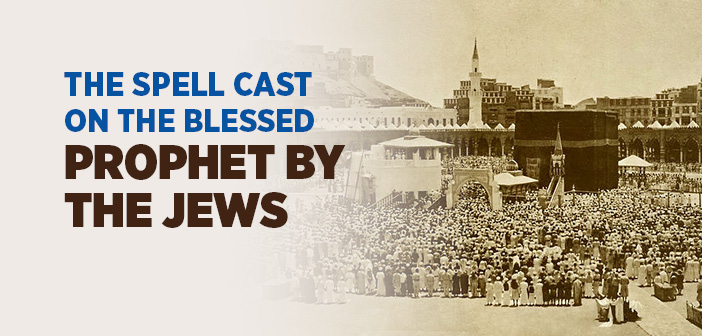What is spell cast?
It was during those days when the Jewish leaders made a proposal to the crafty magician Asam ibn Labid, on the surface a Muslim, yet carrying on his Jewish belief in secret.
“You are our most skillful magician”, they said. “Muhammad has cast a spell on our men and women and we can not do anything about it. You have seen what he has done to us; how he has defied our religion, killed and sent into exile many of our own. For all the damage he has caused us, we entrust you with the duty of punishing him by casting on him a spell!” They paid Asam ibn Labid three dinars of gold for the mission.
Ibn Labid set himself to the task immediately and began looking for ways of obtaining a few strands of the Noble Prophet’s -upon him blessings and peace- hair. Somehow he did manage to get hold of what he was after. Tying certain kinds of knots on the hairs and blowing into them, he placed it in a dried shell of the flower of a date. He then placed it under a stepping stone inside the Zarwan Well. Right after the spell, the Blessed Prophet -upon him blessings and peace- fell ill. The light of his eyes faded away. The illness that ensued for days on end reduced his appetite and he was not able to eat and drink anything.
Allah, glory unto Him, informed his Prophet -upon him blessings and peace- the identity of the person who had put a spell on him and the whereabouts of the knotted hairs. The Blessed Prophet -upon him blessings and peace- thus sent Ali and Ammar -Allah be well-pleased with them- to the Zarwan Well. They both drew the water from inside, which had turned red, like henna, and completely emptied the well. Lifting the stepping stone inside, they found the knots underneath.
In the meantime, Jibril -upon him peace- brought the two suwar of al-Falaq and an-Nas. With the Prophet’s -upon him blessings and peace- recital of each ayah, a knot of the spell became undone; and with the reciting of the very last ayah, the Noble Messenger -upon him blessings and peace- felt an instant relief, like he had been freed from a rope. He regained his appetite. He subsequently had the Zarwan Well closed. As for Ibn Labid, neither did the Blessed Prophet -upon him blessings and peace- summon him nor did he mention his crime and hold it against him. Not only did he not punish Ibn Labid, clearly guilty of attempting to take his life, he did not even hold a personal grudge against Ibn Labid’s tribesmen, the Jews of Banu Zurayq.[1]
The Blessed Prophet -upon him blessings and peace- one day stated, “Abstain from the seven destroyers!”
“What are they, Messenger of Allah?” asked the Companions.
“Ascribing partners to Allah, casting spells, unjustly taking a life that Allah has declared untouchable, indulging in usury, usurping the possessions of an orphan, fleeing from the battlefield and charging chaste and innocent women with adultery…” (Bukhari, Wasaya, 23; Muslim, Iman, 145)
In another hadith, the Prophet of Allah -upon him blessings and peace- declares:
“Whoever ties a knot and blows in it, has cast a spell. Whoever has casted a spell has fallen into shirk.” (Nasai, Tahrim, 19)
“The salat of an arraf[2], who gives news of the whereabouts of a stolen and lost property, and who asks him something and confirms what he says, will not be accepted for forty days.” (Muslim, Salam, 125)
[1] See, Ibn Saad, II, 197; Bukhari, Tıbb, 47, 49; Muslim, Salâm, 43; Nasai, Tahrîm, 20; Ahmad, IV, 367, VI, 57; Aynî, XXI, 282.
[2] A kahin, or a soothsayer, is a person who claims knowledge of future happenings. Although from one perspective an arraf is also a kahin, the term is reserved for a person who gives information on stolen or lost property. There is also a munajjim, or an astrologer, who, too, is a kahin, with the difference that a he claims knowledge of future events by observing stars.
Source: Osman Nuri Topbaş, The Prophet Muhammed Mustafa the Elect II, Erkam Publications





